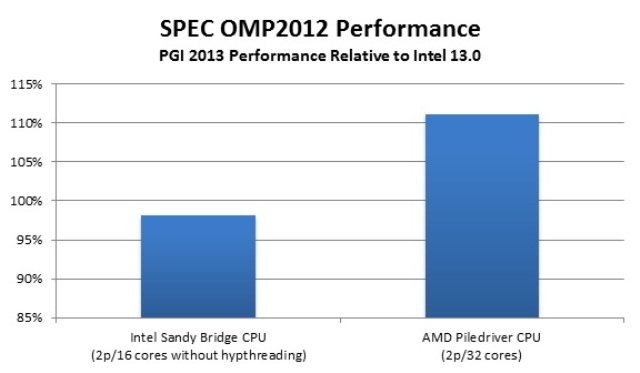The Portland Group®, a wholly owned subsidiary of STMicroelectronics, today announced that the 2013 release of the PGI® high-performance parallelizing compilers and development tools for Linux, Apple OS X and Microsoft Windows is now available. PGI 2013 includes new features and capabilities for programming the latest HPC accelerators using the OpenACC API. It also delivers significant performance gains on multi-core x64 processors.
 SPECompG_base2012 relative performance as measured by The Portland Group during the weeks of January 28 and February 4, 2013. The number of OpenMP threads was set to match the number of cores on each system.
SPECompG_base2012 relative performance as measured by The Portland Group during the weeks of January 28 and February 4, 2013. The number of OpenMP threads was set to match the number of cores on each system.
“The high-performance computing landscape is evolving rapidly. With the recent introduction of new accelerators from NVIDIA, Intel and AMD, HPC users have more options than ever,” said Douglas Miles, director of The Portland Group. “With PGI 2013, we are expanding support within our PGI Accelerator programming tools so developers wishing to access the huge potential performance of these new platforms can do so in a consistent, productive and portable way.”
The 2013 release of the PGI Accelerator™ native Fortran 2003 and C99 compilers expands support for the OpenACC directive-based accelerator programming model through the addition of an all-new PGI Accelerator C++ compiler. All three compilers feature expanded support for the OpenACC standard as well as new PGI extensions for supporting multiple devices. PGI Accelerator compilers also now target the latest NVIDIA Tesla K20 and K20X GPUs. Support for targeting Intel Xeon Phi coprocessors and AMD APUs and discrete GPUs with OpenACC is planned for a future release. New CUDA Fortran extensions in PGI 2013 include support for textures as well as support for dynamic parallelism and separate compilation on suitable CUDA-enabled hardware. Both PGI Accelerator and CUDA Fortran now support the latest CUDA 5.0 software environment from NVIDIA in addition to supporting multiple devices from a single program or host thread.
In addition to expanded support for accelerators, PGI 2013 also delivers significantly faster performance on multi-core x64 processors including industry-leading OpenMP parallel performance on the new SPEC® OMP2012 benchmark suite running on the latest AVX-enabled processors from AMD and Intel (see chart below). Overall performance on the SPEC CPU 2006 floating-point benchmarks is over 10% faster compared to the initial version of PGI 2012 released in February 2012. Similar performance gains have been seen on other HPC benchmarks as well.
Additional features and enhancements in PGI 2013 include:
- GNU 4.7 compatible C++ in an all-new compiler that comes complete with the full suite of PGI optimizations plus support for CUDA-x86, OpenMP and OpenACC.
- Fortran 2003 features added include recursive I/O, parameterized derived types, deferred type parameters and deferred character length.
- OpenMP 3.1 support including task yield and new atomic functions in C.
- PGI Visual Fortran® is now integrated with Visual Studio 2012 and includes the Visual Studio 2012 shell.
- PGDBG® parallel MPI/OpenMP graphical debugging tool has an improved interface for displaying source code including a new user configurable disassembly display.
- PGI 2013 supports the latest operating system releases including Red Hat Enterprise Linux 6.3, Fedora 17, OpenSuSE 12, Ubuntu 12.10, Windows 8 and OS X Mountain Lion.